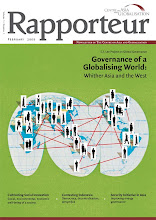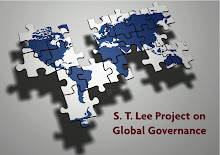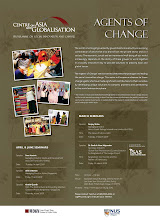Wednesday, April 22, 2009
Creating Social Stock Exchange Asia
My phone beeps. I forgot to put my mobile phone on silent mode. I am thoroughly embarrassed because I am sitting in the first of hopefully many important meetings with the officials of the Monetary Authority of Singapore. We are discussing the merits of situating a Social Stock Exchange in Singapore. I cannot resist -- I glace down at my phone under the table and see that the text message is from the company registration board telling me that the registration of Social Stock Exchange Asia (SSXA) has been approved.
I am ecstatic. I have been on pins and needles because the registration took several weeks to process (as opposed to the 24 hours it usually takes to register a company in Singapore.) I had worried that this was because the only other exchange in the country is the Singapore Stock Exchange, partly owned by the government. Needless to say, even the mere registration of SSXA had the potential to raise a few eyebrows.
Raised eyebrows aside, the fact remains that on March 20, 2009, SSXA was created to provide a capital market for social good. This indeed is the start of a new era and an apt response to the financial greed that gripped most of the developed world for the past several decades. The best part is that SSXA has the potential to be the sensible Asian response to the Western mayhem and bring social consciousness to the forefront of global financial markets.
Creating a Social Stock Exchange is indeed a lofty goal; but I cannot aim at anything less lofty. Exactly ten years ago, I created my first social purpose company, oneNest. It was an idea that germinated from my time at Grameen Bank when I saw many micro-entrepreneurs struggling due to lack of market access for their products. These entrepreneurs needed more than access to credit, they needed help managing the supply chain. Grameen Bank ultimately recognized this and eventually responded by creating Grameen Check and Grameen Shamogri.
A few years later when the twists and turns of life gave me the opportunity to start a company, I reached back to my Grameen days and created a market place where I brought together, on the one hand, thousands of microcredit borrowers and cooperatives creating beautiful handmade personal and household products with, on the other hand, luxury catalog companies, boutiques and department stores in the Western market. I ran and grew oneNest and eventually sold it (granted I had very little control of the company by the end -- but that is another story). However, the thought always nagged me that I could not do enough for the disadvantaged millions of the world. I had to do more. Now is my second chance.
What will SSXA do? Simply put, it will increase access to capital for enterprises with a social mission. On a bigger scale, it will help social enterprises further develop the professionalism of their operations and create a whole ecosystem around it to support social enterprises – some of which is already in the works. SSXA will be Asia’s first social stock exchange, providing a trading platform and an efficient capital raising mechanism for Asian Social Enterprises (SEs), including both for-profit and not-for-profit entities with a social mission. SSXA will connect these SEs with impact investors seeking to achieve both a social return and an economic return on their investment while providing capital to fund innovative social businesses. This platform will also enable philanthropic donations.
Such an exchange will bring all the relevant players in the ecosystem together, speaking the same language and assisting one another in creating greater social good. It will encourage the governments, civil societies, academics, investment banks, research companies, auditing bodies and social enterprises to agree on a framework to measure social value, common terminology, transparency, and social and financial goals.
Social enterprises seeking to list shares or bonds on the exchange will go through proper social and financial auditing (third party validation) and report regularly to investors on both their social and financial results. Investors purchasing shares and bonds on the exchange will be attracted by the transparent disclosure of social returns and will evaluate companies based on both their social and financial returns. They will understand that a social enterprise may not maximize its earnings due to the cost associated with fulfilling its social mission. And they will be willing to accept a limited financial return in order to support this mission. Of course, given the current dismal state of the market for profit-maximizing businesses, any economic return topped with a social return may feel like a windfall to an investor.
Social investors are an emerging group of investors in the financial market. In Europe, and especially in the UK, they are a rapidly growing group which initially focused on Socially Responsible Investing (SRI) but now includes many investors focused on investing in social enterprises and social purpose businesses. These investors comprise of private investors, high net worth individuals, family offices, investment funds and charitable foundations with the common thread being that they seek double bottom line returns (ie, social and financial returns) from their investments. Given the current financial climate, more and more charities are also leaning towards ‘mission-related investment’ as well. In the UK alone, there are now over 25 billion pounds dedicated to socially responsible investment.
In Asia, the social investor pool is smaller, but growing. Bodies such as UNPRI (United Nations Principles for Responsible Investing) and ASRIA (Association for Socially Responsible Investing in Asia) are actively promoting the notion of socially responsible investing. A number of family offices and wealthy individuals in Asia are also focused on social investment. Much of the interest so far has been focused on microfinance institutions. In addition, Islamic banking has been very active in South East Asia in promoting their unique brand of responsible investing. SSXA will push the envelope on the existing socially responsible investing, bring forward social enterprises and social purposes companies (in addition to microfinance) in energy, water/sanitation, media, fair-trade, health, education, and cottage industry and bring to the attention of these investors a whole new set of enterprises which would not have been noticed otherwise.
Such a platform/exchange cannot be created overnight. It will take years before SSXA is a robust trading platform. However, with the proper assistance and support from other members of the social investing ecosystem, it can become the cornerstone of a potentially very large social enterprise economy. Given the current economic climate, I have to say, organizations and government bodies are ready to pause and listen. I thank them for that. As more players embrace the idea of SSXA, each will become a crucial part of a peaceful revolution in the making. [Dureen]
Dureen Shahnaz is Founder of Social Stock Exchange Asia and Head of Programme on Social Innovation and Change at the Lee Kuan Yew Schoool of Public Policy, National University of Singapore
Labels:
Social Entrepreneurism
Subscribe to:
Post Comments (Atom)










2 comments:
.Durreen, Being an all about me yuppie, in the u.s.a,
and seeing what greed has done to this country, I
commend what you are trying to accomplish and wish
you much success. In a global economy we must wish
that every human being is excepted for what
they have to offer, and that everyone is given a chance
to rise above the condition they were born into.
Sincerely,
Dori B.
to offer,
dear miss Shahnaz,
i am keen to know more about SSXA. any more information?
Jeff
Post a Comment